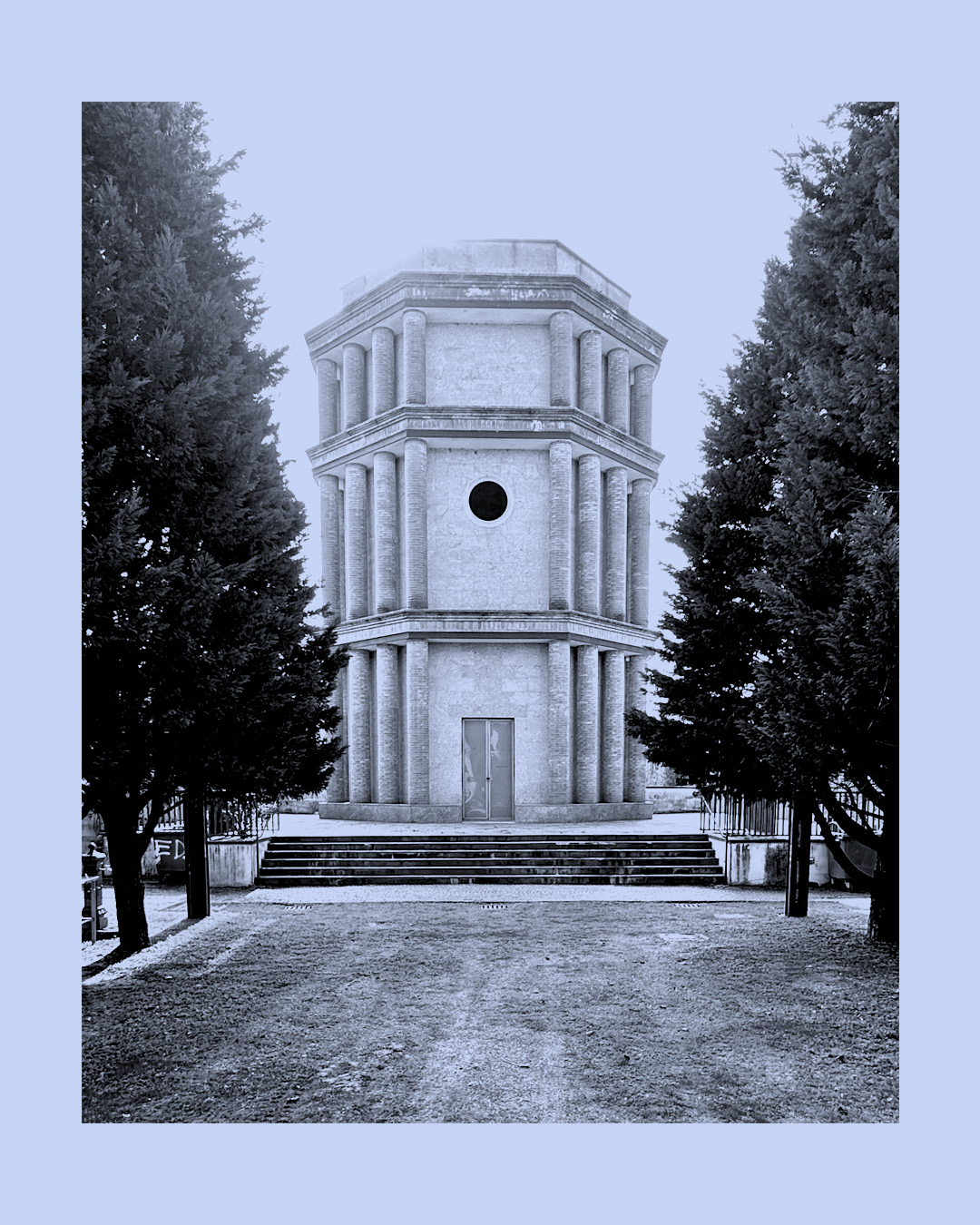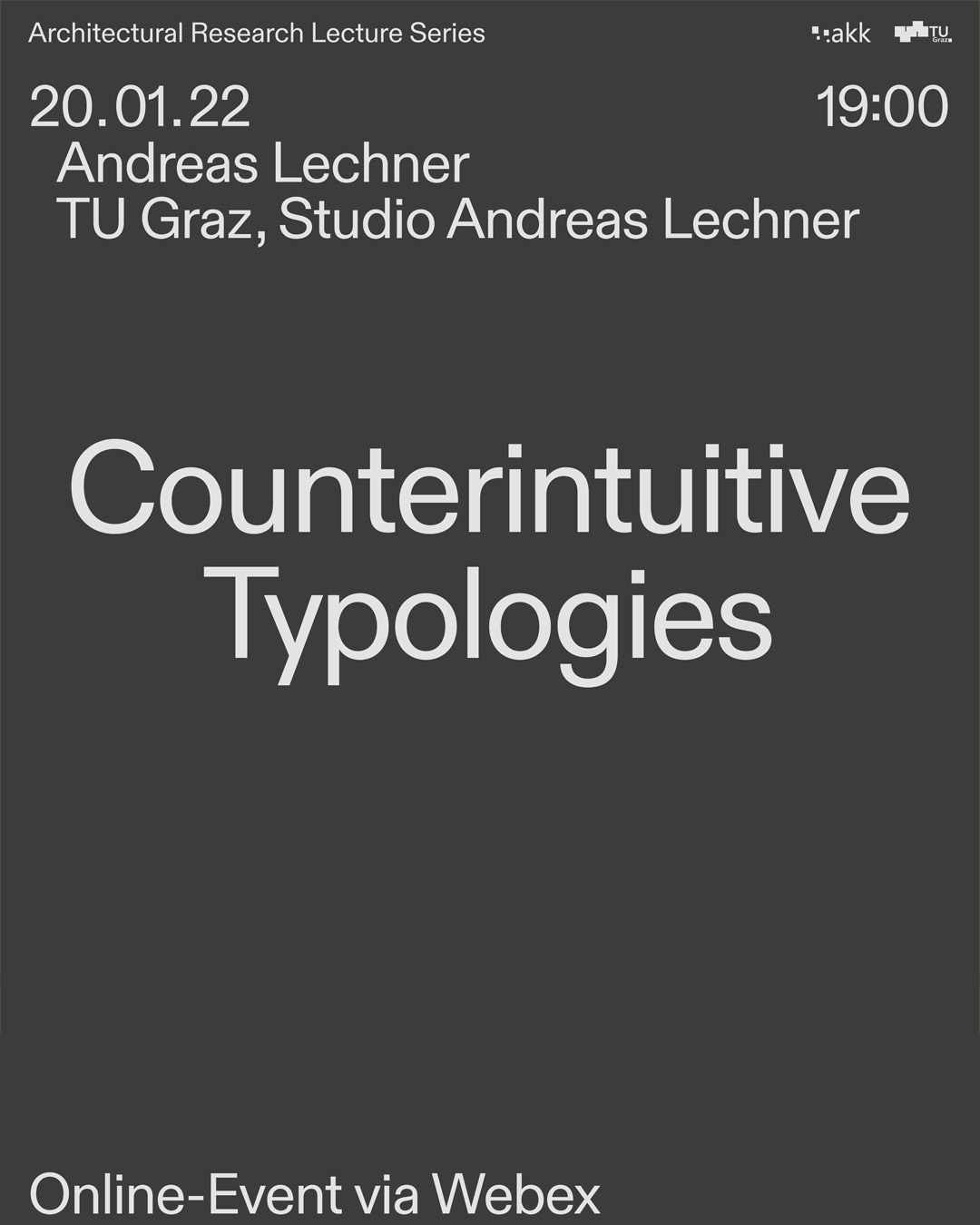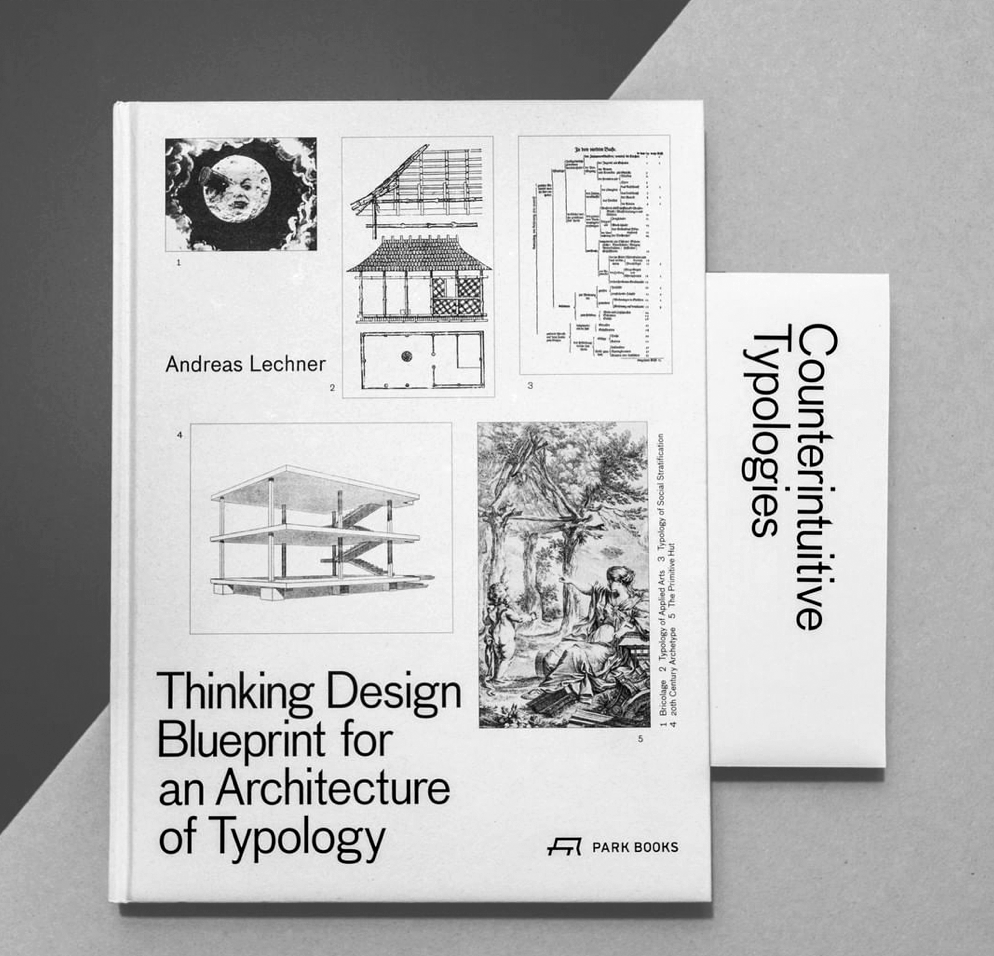Counterintuitive Typologies
︎︎︎More
![]()
Fig. 4
![]()
![]()
![]()
![]()
![]()
![]()
![]()
![]()
![]()
![]()
![]()
![]()
![]()
Fig. 5
Counterintuitive Typologies is both the title and guiding principle for Andreas Lechner’s research group at TU Graz, encompassing design studios, supervised master’s theses, international collaborations, and funded research projects. It proposes a redefinition of typology not as static form but as cultural critique, positioning architectural types as historically embedded yet continuously mutable structures. Capable of both poetic resonance and ecological engagement the groups overarching goal is to tackle contemporary urban challenges—such as the critical need for urban infill and city densification—by integrating upcycling, adaption and reuse of existing structures. The project seeks to bridge and critically advance the epistemology of architecture, particularly when juxtaposing cultural significance with the tangible themes of circularity.
Counterintuitive Typologies comprises design studios at TU Graz, PhD seminars at Milan Polytechnic, a number of master’s theses, various peer reviewed publications and papers as well as a research collaboration on "Peripheries - Peripherocene" with Northumbria University.
︎︎︎www.CounterintuitiveTypologies.com.
Counterintuitive Typologies comprises design studios at TU Graz, PhD seminars at Milan Polytechnic, a number of master’s theses, various peer reviewed publications and papers as well as a research collaboration on "Peripheries - Peripherocene" with Northumbria University.
︎︎︎www.CounterintuitiveTypologies.com.
︎︎︎More
![Fig. 1 Robert Venturi’s “Recommendation for a monument” (1972) next to Madrid PKMN Architectures greenish update from 2014.]() Fig. 1
Fig. 1
Robert Venturi’s Recommendation for a Monument (1972) alongside PKMN Architecture’s green-hued reinterpretation from 2014.
![]()
Fig. 2
Appended brochure “Counterintuitve Typologies“ featuring 12 master’s theses (2015–2021) exploring peripheral and commercial vernaculars through precise drawings and conceptual revaluation of
city edges, infrastructural voids, continuous building and future monuments, in: Andreas Lechner, Thinking Design - Blueprint for an Architecture of Typology, Zurich: Park Books 2021.
![]()
Fig. 3
144 project floor plans drawn at same scale from Thinking Design - Blueprint for an Architecture of Typology, Zurich: Park Books 2021.

Fig. 4
Poster for the TU Graz Architectural Research Lecture Series, Winter Semester 2021/22. Counterintuitive Typologies was launched as part of the series on January 20, 2022.

Fig. 6 Aldo Rossi’s extension of the Cimiterio di Ponte Sesto in Rozzano with G. Da Pozzo and F.S. Fera (1989–1995), Viale alberato with chapel, Southern Periphery of Milan, March 2023, Photo: © Andreas Lechner
Between Critique, Care, and Ecological Reuse
Counterintuitive Typologies is Andreas Lechner’s critical design and research initiative addressing architecture’s contemporary entanglements with aesthetic commodification, ecological degradation, and institutional inertia. Rooted in the concept of continual building—a practice of adaption and reuse that engages the overlooked territories of the urban periphery—the project reclaims neglected typologies such as strip malls, vacant warehouses, and infrastructural voids as sites of latent spatial potential and cultural reactivation.
Drawing on a lineage of architectural critique—Venturi’s valorization of contradiction, Rossi’s notion of urban memory, Rowe’s analytical method, and Tafuri’s ideological exposure—Counterintuitive Typologies reframes typology as a tool of epistemological resistance. At its core lies the question of how such strategies might subvert the recursive logic of gentrification and instead enable inclusive, socially generative urban transformations. While architectural history—in, for, and of architecture—forms the methodological scaffold through which typology becomes an instrument of spatial critique, this inquiry is equally grounded in design studios, theses, and built work (Figs. 2, 3), which elaborate four interlinked principles central to the project:
– Typological Reinterpretation: Building types are not static; they evolve under cultural, economic, and ecological pressures. Misplacing or recontextualizing types becomes a strategic act—subverting both architectural convention and speculative market logic. Low-status types such as malls, warehouses, or vacant offices are re-read for their affordances—their potential to be re-scripted as civic and social infrastructure.
– Peripheral Grounds: Peripheral territories—defined by sprawl, voids, and infrastructural residue—are reframed as repositories of latent monumentality and embodied energy. These sites offer fertile ground for spatial reimagination and projective design.
– Continual Building: Favouring transformation over demolition, the initiative aligns with ecological ethics by advancing Umbau—a methodology of architectural reuse that engages the existing fabric as both constraint and opportunity, method and ethic.
– Material Resistance: Against the blankness of tabula rasa urbanism and the seductions of spectacle, the projects foreground typological ambiguity and drawing as critique—tools that reveal architecture’s potential for care, repair, and redefinition. Ongoing inquiries are challenging architecture’s complicity through emphasizing historical reflexivity and typological ambiguity. Architectural designs becomes thus a method –a situated form– of resistance exactly because it is materially precise, theoretically grounded, and ecologically attuned.
By embracing peripheries, hybrid programs, and typological drift, Counterintuitive Typologies proposes an architecture that resists commodification, fosters initiative, and addresses ecological and societal urgencies. Here, design is not prophecy but care—not solution, but transformation. It embeds critique within form, matter, and memory.
Teaching and Pedagogy
Studios and seminars explore low-status environments not for novelty, but for their potential to surprise, reframe, and resist normative expectations. Emphasizing bricolage as a method—merging theory, history, and material engagement—design becomes philosophical inquiry. Students cultivate critical spatial literacy and ecological sensitivity by engaging both high- and low-status contexts as equally worthy of architectural attention (Fig. 4).
Research Initiatives and Outputs
Counterintuitive Typologies is Andreas Lechner’s critical design and research initiative addressing architecture’s contemporary entanglements with aesthetic commodification, ecological degradation, and institutional inertia. Rooted in the concept of continual building—a practice of adaption and reuse that engages the overlooked territories of the urban periphery—the project reclaims neglected typologies such as strip malls, vacant warehouses, and infrastructural voids as sites of latent spatial potential and cultural reactivation.
Drawing on a lineage of architectural critique—Venturi’s valorization of contradiction, Rossi’s notion of urban memory, Rowe’s analytical method, and Tafuri’s ideological exposure—Counterintuitive Typologies reframes typology as a tool of epistemological resistance. At its core lies the question of how such strategies might subvert the recursive logic of gentrification and instead enable inclusive, socially generative urban transformations. While architectural history—in, for, and of architecture—forms the methodological scaffold through which typology becomes an instrument of spatial critique, this inquiry is equally grounded in design studios, theses, and built work (Figs. 2, 3), which elaborate four interlinked principles central to the project:
– Typological Reinterpretation: Building types are not static; they evolve under cultural, economic, and ecological pressures. Misplacing or recontextualizing types becomes a strategic act—subverting both architectural convention and speculative market logic. Low-status types such as malls, warehouses, or vacant offices are re-read for their affordances—their potential to be re-scripted as civic and social infrastructure.
– Peripheral Grounds: Peripheral territories—defined by sprawl, voids, and infrastructural residue—are reframed as repositories of latent monumentality and embodied energy. These sites offer fertile ground for spatial reimagination and projective design.
– Continual Building: Favouring transformation over demolition, the initiative aligns with ecological ethics by advancing Umbau—a methodology of architectural reuse that engages the existing fabric as both constraint and opportunity, method and ethic.
– Material Resistance: Against the blankness of tabula rasa urbanism and the seductions of spectacle, the projects foreground typological ambiguity and drawing as critique—tools that reveal architecture’s potential for care, repair, and redefinition. Ongoing inquiries are challenging architecture’s complicity through emphasizing historical reflexivity and typological ambiguity. Architectural designs becomes thus a method –a situated form– of resistance exactly because it is materially precise, theoretically grounded, and ecologically attuned.
By embracing peripheries, hybrid programs, and typological drift, Counterintuitive Typologies proposes an architecture that resists commodification, fosters initiative, and addresses ecological and societal urgencies. Here, design is not prophecy but care—not solution, but transformation. It embeds critique within form, matter, and memory.
Teaching and Pedagogy
Studios and seminars explore low-status environments not for novelty, but for their potential to surprise, reframe, and resist normative expectations. Emphasizing bricolage as a method—merging theory, history, and material engagement—design becomes philosophical inquiry. Students cultivate critical spatial literacy and ecological sensitivity by engaging both high- and low-status contexts as equally worthy of architectural attention (Fig. 4).
Research Initiatives and Outputs
- Thinking Design – Blueprint for an Architecture of Typology
Zurich: Park Books, 2021 (Fig. 2, 3, 4)
A visual taxonomy of 144 case studies across 12 typologies, spanning antiquity to the present. Eschews abstraction in favour of analogical clarity. The appended booklet introduces the first series of Counterintuitive Typologies, first time presented at TU Graz Architectural Research Lecture Series, Winter Semester 2021/22.
- CBT – Counterintuitive Building Types (2022–2025)
Funded by the Austrian Research Promotion Agency (FFG)
Investigates the adaptive reuse of underutilized commercial typologies (e.g., strip malls) to explore new cultural and civic potentials. (Principal Investigator: Andreas Lechner)
- Architectural Affordances – Typologies of Umbau (2023–2025)
Funded by DAStU – Politecnico di Milano
Co-led by Gennaro Postiglione, the project examines the inherent potential of existing structures to enable spatial and social transformation, featuring 30 international case studies in architectural reuse.
- Peripheries – Peripherocene (2023–2026)
With Cameron McEwan, Northumbria University, UK
Explores the ecological and architectural significance of peripheral landscapes in the Anthropocene. Forthcoming as a special issue of The Journal of Architecture (2025).












Fig. 5
Studio Posters of “Counterintuitive Typologies” iterations at TU Graz 2020 to 2023.
Selected References
Venturi, R. (1966). Complexity and Contradiction in Architecture. New York: Museum of Modern Art.
Rossi, A. (1982). The Architecture of the City. Cambridge, MA: MIT Press.
Rowe, C. (1976). The Mathematics of the Ideal Villa and Other Essays. Cambridge, MA: MIT Press.
Tafuri, M. (1976). Architecture and Utopia: Design and Capitalist Development. Cambridge, MA: MIT Press.
Lechner, A. (2021). Thinking Design: Blueprint for an Architecture of Typology. Zurich: Park Books.
Attemsgasse 11
8010 Graz
Austria
T+43 664 130 3255
E office [at] andreaslechner.at
© Andreas Lechner. All rights reserved. Unless otherwise stated, all materials on this website and the ideas incorporated herein, as an instrument of professional service, are protected by copyright and other intellectual property rights belonging to Andreas Lechner, its affiliates or its licensors and all such rights are hereby asserted and reserved. No part of this website may be copied, reproduced, republished, posted, transmitted or distributed in any way for commercial purposes. Any modification or use of the information contained on this website for any purpose not explicitly permitted without prior written consent is a violation of the author’s intellectual property rights and is strictly prohibited.
|︎︎︎1 Works |︎︎︎2 Research |︎︎︎2.1 Publications |︎︎︎2.2 Lectures |︎︎︎2.3 Teaching |︎︎︎2.4 Theses
|︎︎︎3 Contact |︎︎︎3.1 Full CV |︎︎︎Imprint & DSGVO
|︎︎︎1 Works |︎︎︎2 Research |︎︎︎2.1 Publications |︎︎︎2.2 Lectures |︎︎︎2.3 Teaching |︎︎︎2.4 Theses
|︎︎︎3 Contact |︎︎︎3.1 Full CV |︎︎︎Imprint & DSGVO

 Fig. 1
Fig. 1 
